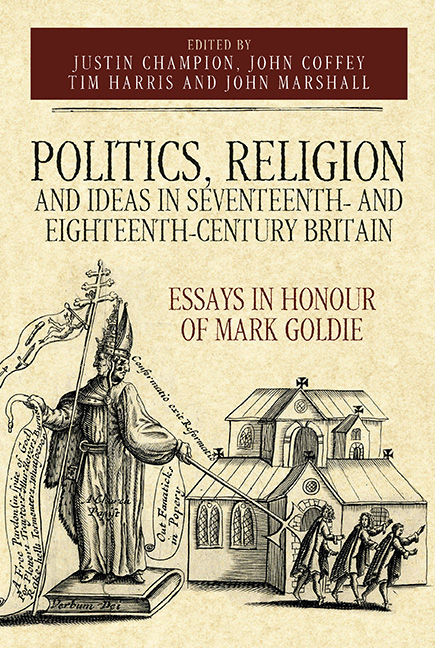 Politics, Religion and Ideas in Seventeenth- and Eighteenth-Century Britain
Politics, Religion and Ideas in Seventeenth- and Eighteenth-Century Britain Book contents
- Frontmatter
- Dedication
- Contents
- Notes on Contributors
- Acknowledgements
- Notes on Text
- Abbreviations
- Introduction: Mark Goldie – An Appreciation
- 1 Constitutional Royalism Reconsidered: Myth or Reality?
- 2 Teaching Political Thought in the Restoration Divinity Faculty: Avant-Garde Episcopacy, the Two Kingdoms and Christian Liberty
- 3 Violence, Protest and Resistance: Marvell and the Experience of Dissent after 1670
- 4 Bulstrode Whitelocke and the Limits of Puritan Politics in Restoration England
- 5 The Assassination of Archbishop Sharp: Religious Violence and Martyrdom in Restoration Scotland
- 6 Compassing Allegiance: Sir George Mackenzie and Restoration Scottish Royalism
- 7 Corruption and Regeneration in the Political Imagination of John Locke
- 8 Locke the Censor, Locke the Anti-Censor
- 9 London, Locke and 1690s Provisions for the Poor in Context: Beggars, Spinners and Slaves
- 10 The Reception of Locke's Politics: Locke in the République des Lettres
- 11 Court Culture and Godly Monarchy: Henry Purcell and Sir Charles Sedley's 1692 Birthday Ode for Mary II
- 12 Thanksgivings and the Signs of the Times: The Apocalypse in the Long Eighteenth Century
- 13 The ‘Secret Reformation‘ and the Origins of the Scottish Catholic Enlightenment
- 14 The Surprising Lineage of Useful Knowledge
- 15 The Vicissitudes of Innovation: Confessional Politics, the State and Philosophy in Early Modern England
- A Bibliography of the Writings of Mark Goldie
- Index
- Studies in Early Modern Cultural, Political and Social History
- Tabula Gratulatoria
2 - Teaching Political Thought in the Restoration Divinity Faculty: Avant-Garde Episcopacy, the Two Kingdoms and Christian Liberty
Published online by Cambridge University Press: 12 October 2019
- Frontmatter
- Dedication
- Contents
- Notes on Contributors
- Acknowledgements
- Notes on Text
- Abbreviations
- Introduction: Mark Goldie – An Appreciation
- 1 Constitutional Royalism Reconsidered: Myth or Reality?
- 2 Teaching Political Thought in the Restoration Divinity Faculty: Avant-Garde Episcopacy, the Two Kingdoms and Christian Liberty
- 3 Violence, Protest and Resistance: Marvell and the Experience of Dissent after 1670
- 4 Bulstrode Whitelocke and the Limits of Puritan Politics in Restoration England
- 5 The Assassination of Archbishop Sharp: Religious Violence and Martyrdom in Restoration Scotland
- 6 Compassing Allegiance: Sir George Mackenzie and Restoration Scottish Royalism
- 7 Corruption and Regeneration in the Political Imagination of John Locke
- 8 Locke the Censor, Locke the Anti-Censor
- 9 London, Locke and 1690s Provisions for the Poor in Context: Beggars, Spinners and Slaves
- 10 The Reception of Locke's Politics: Locke in the République des Lettres
- 11 Court Culture and Godly Monarchy: Henry Purcell and Sir Charles Sedley's 1692 Birthday Ode for Mary II
- 12 Thanksgivings and the Signs of the Times: The Apocalypse in the Long Eighteenth Century
- 13 The ‘Secret Reformation‘ and the Origins of the Scottish Catholic Enlightenment
- 14 The Surprising Lineage of Useful Knowledge
- 15 The Vicissitudes of Innovation: Confessional Politics, the State and Philosophy in Early Modern England
- A Bibliography of the Writings of Mark Goldie
- Index
- Studies in Early Modern Cultural, Political and Social History
- Tabula Gratulatoria
Summary
No one has done more than Mark Goldie to shape our understanding of the relationship between English political and religious thought in the Restoration and Revolutionary periods. If J. N. Figgis was the real founder of the so-called ‘Cambridge School of the History of Political Thought’, then Goldie is surely his most natural successor. But there is one area that not even Goldie, nor his many research students, nor – for that matter – anyone else has ever investigated: the political thought being taught in the universities of seventeenth-century England, and specifically that being taught to fledgling clerics in the divinity faculty. And yet, what could be more important for enhancing our knowledge of the way in which the boundaries of political conformity were policed in the period? By the seventeenth century, the English priesthood was a graduate profession. A university divinity professor thus had unparalleled power over the intellectual formation of a generation or more of clerics. Those clerics in turn were often the first (if not only) avenue by which the laity were introduced to political ideas – ideas that were not always as supinely deferential as one might assume. More generally, the long seventeenth century was – in England as in Europe – a golden age for universities, in terms of student numbers and resource allocation. In view of all this, the absence of a concerted study of university theological pedagogy is one of the great lacunae of seventeenth-century English religious and intellectual history.
In this short essay I shall endeavour to offer what is – I think – the first ever study of political thought in seventeenth-century English university theological pedagogy. I shall do so on the basis of a rather remarkable set of primary sources: the manuscript record of the theology disputations presided over by Joseph Beaumont during his tenure as Regius Professor of Divinity at Cambridge between 1674 and his death in 1699. What is particularly valuable about this evidence is that we possess not only the titles of the 376 disputed questions, but also the full text of Beaumont's ‘Determinations’ (i.e. judgements) upon them. This evidence offers us perhaps the best insight into the political indoctrination of the Restoration clergy. Moreover, that insight is of some historiographical significance.
- Type
- Chapter
- Information
- Politics, Religion and Ideas in Seventeenth- and Eighteenth-Century BritainEssays in Honour of Mark Goldie, pp. 39 - 58Publisher: Boydell & BrewerPrint publication year: 2019


